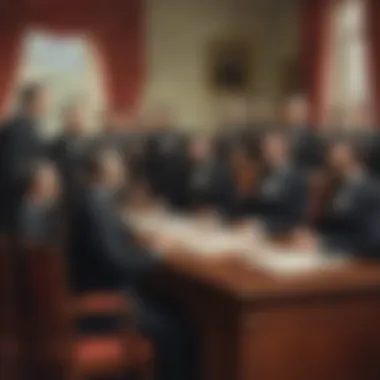Exploring the Intriguing Life of Abraham Lincoln


Intro
Abraham Lincoln is a pivotal figure in American history. Known for his leadership during the Civil War and his bold vision for equality, many voices depict a strong and steady character. However, there are nuanced tales and surprising elements of his life that are not commonly articulated. This article investigates those lesser-known aspects, offering an in-depth analysis of his formative years, political stance, and personal ideologies. By exploring these hidden layers, readers can gain a more comprehensive view of Lincoln as a person, not just a historical icon.
Fun Facts and Trivia
There are interesting anecdotes and lesser-known facts about Lincoln that can enrich our understanding.
- Only U.S. President to Hold a Patent: Lincoln was granted a patent for a device to lift boats over shoals. A unique piece of insight into his innovative thinking.
- A Tall Physical Stature: Standing at 6'4
Preamble to Abraham Lincoln
Abraham Lincoln remains one of the most pivotal figures in American history. His life is a fascinating study that elicits numerous discussions about leadership, values, and resilience. This section aims to frame Lincoln within historical context and provide insights into his early life, emphasizing how these elements shaped his beliefs and actions as a leader.
Historical Context
Lincoln's life unfolded during a time of immense change in the United States. The nation grappled with slavery, economic division, and the question of civil rights during the 19th century. Contracting the forces of nationalism and sectionalism, his presidency was its zenith, amid the Civil War. Contextually, Lincoln’s rise as a leader brings to light the enormous pressures faced by leaders during crises. Understanding this backdrop gives clarity to his decisions, especially in addressing deeply polarized American society. Factors such as the expansion of the country and conflicts over slavery highlighted tensions that defined Lincoln's presidency. Knowing this context provides depth to our understanding of his actions and philosophies.
Early Life Overview
Lincoln was born on February 12, 1809, in a one-room cabin in Hardin County, Kentucky. His early years were marked by hardship. The family moved to Indiana when he was young, and Lincoln faced the trials of frontier life, such as poverty and limited formal education. Remarkably, he absorbed knowledge through books, demonstrating a voracious appetite for learning. Working on farms, Lincoln honed practical and social skills that would become beneficial later in his political life.
These experiences instilled in him a sense of determination. Although educated sporadically in common schools, Lincoln's commitment to self-education played a crucial role in forming his character. Such conditions shaped his empathy for the struggling, a quality that influenced how he handled his presidential duties. Overall, understanding Lincoln's early life helps examine the roots of his thoughts on equality and justice.
Lincoln's Early Influences
Understanding Abraham Lincoln's early influences illuminates the factors that shaped his life and his political ideology. His formative years were marked by a unique combination of family background, education, and self-learning experiences. These aspects heavily contributed to his development as a thinker and leader, underlining the importance of resilience and flexible understanding of the world around him.
Family Background
Abraham Lincoln came from a modest background. He was born on February 12, 1809, in a log cabin in Hardin County, Kentucky, which is now LaRue County. His parents, Thomas and Nancy Lincoln, were frontier farmers. Family interactions molded Lincoln's personality, instilling values of hard work, humility, and community service. Despite the family’s limitations, they emphasized the importance of education and moral growth, thus establishing a foundation for many of Lincoln's later beliefs.
Lincoln's relationship with his father was complex. Thomas Lincoln was often described as a formidable man, who had strong views on the matters of success and self-sufficiency. This perhaps fostered a sense of independence in Lincoln, but also contributed a sense of longing for emotional connection, particularly from his mother, who provided nurturing presence.
“The strength of relations shapes the course of lives and leadership.”
Education and Self-Learning
Lincoln's formal education was limited. He attended school irregularly, accumulating only about one year of schooling in total. However, this did not stifle his thirst for knowledge. He became a voracious reader. It is said that he borrowed many books and spent countless hours on passionate self-study. Lincoln read everything from the Bible to works by Shakespeare, as well as legal texts.
- Homework was self-directed for Lincoln. He often educated himself by grappling with literary classics or social and political thought, reflecting an analytical mindset.
- Reading was a method of escapism, providing him an avenue to learn and expand his worldview despite the harshness of frontier life.
This propensity for self-instruction played a pivotal role in developing Lincoln’s eloquence and depth of thought. His ability to convey complex issues in a manner that audiences could comprehend was linked directly temporal environment and his intellectual curiosity. Consequently, his early influences grounded him in the principles of empathy, justice, and the pursuit of equality, which would later resonate throughout his political career and personal convictions.
Political Beginnings
The political beginnings of Abraham Lincoln mark a significant moment not only in his life but in American history. Lincoln’s ascent in the political realm illustrates the intersection of personal integrity, legal acumen, and societal change, enriching the broader narrative of mid-19th century America. By examining Lincoln’s initial forays into law and politics, we uncover the foundations that informed his leadership style during his presidency.
Law Career
Abraham Lincoln’s law career serves as a vital element in understanding his approach to governance. Beginning his legal journey in Springfield, Illinois, Lincoln was recognized for his ability to connect legal principles with human stories. Working as a self-taught lawyer, he represented various clients across all socio-economic backgrounds, which gave him a unique insight into the nature of justice and fairness.
During his time practicing, Lincoln gathered a reputation not merely for his legal talents but also for his rhetorical skill. His debates and speeches helped refine his ability to communicate effectively, a capacity that would become essential during his presidency. Elements of this phase of his life included:


- Handling cases that stressed social rights
- Engaging in provocative legal debates
- Commitment to moral integrity in practice
Ultimately, his law career solidified his navigation of political landscapes and informed his stances on vital issues during his time in political office.
Entry into Politics
Lincoln's entry into politics was characterized by gradual acceptance into a network that was complex and competitive. His initial involvement in the Whig Party allowed him to align himself with anti-slavery sentiments, laying groundwork for his future political ideology.
A notable step occurred in 1834 when he was first elected to the Illinois State Legislature. This moment highlighted his growing political ambitions and marked the beginning of a path toward significant leadership.
- Fundamental highlights of Lincoln's political entry:
- Hisorating in the state legislature increased visibility
- Establishng connections with other influential politicians
- Forming his views on slavery as a pressing moral issue
As Lincoln expanded his political career, he attained greater prominence, seen clearly when he was elected to the U.S. House of Representatives in 1847. The experience enriched his political discourse and further honed his legislative abilities.
In these earlier stages, Lincoln crafted the intellectual framework which would support his future presidency. His ability to adapt, build networks, and maintain principled stances laid a strong foundation for major political battles that were to unfold later.
It may be said that the nucleus of Lincoln's public identity formed through his law and early political actions. In a time rife with societal divisions, he emerged as a resonant voice of conscience and reason.
Leadership During the Civil War
Abraham Lincoln's tenure during the Civil War illustrates his pivotal role in a turbulent period of American history. His leadership was not merely about commanding armies; rather, it involved complex decision-making processes that defined a nation. Examining this aspect of Lincoln's character offers insights into his influence on both the war and the broader social fabric of the country.
Decision-Making Processes
Lincoln's decision-making style was characterized by a blend of steadfast conviction and strategic flexibility. He often relied on consultations with his advisers, military leaders, and even his political rivals, which was unusual for any leader of his time. This openness allowed him to gather diverse opinions and weighing critical options, fostering a collaborative environment.
Lincoln understood the necessity of balancing various viewpoints. For instance, during the early days of the war, he faced considerable pressure to act decisively against the Southern states. However, instead of rushing into battle, he chose to assess the situation thoroughly. This tactic bore fruit, particularly during the Battle of Antietam, where intelligence gathered provided crucial insights, resulting in a notable Confederate defeat.
Another significant element of his decision-making was his willingness to adapt strategies as circumstances evolved. His Emancipation Proclamation is a prime example, shifting the war's focus from solely preserving the Union to also addressing the moral implications surrounding slavery. This directive not only strengthened the Union's cause but also galvanized support from abolitionists and peers alike.
Military Strategies
Lincoln's involvement in military strategies demonstrates his hands-on approach to leadership. Unlike many heads of state, he was not content to leave military affairs solely to generals. He frequently monitored battle outcomes, studied tactics, and even communicated directly with the troops.
His relationship with various generals reflected Lincoln's commitment to finding the right leaders for the task. At different points, he initially supported commanders like George McClellan, only to later replace them when he perceived hesitation and inaction. In contrast, his partnership with Ulysses S. Grant showcased a distinct alignment in goals; Grant's aggressive tactics dovetailed with Lincoln's vision for winning the Civil War.
Key strategies implemented under Lincoln's direction included:
- Total War: A strategy designed to weaken the Southern states by targeting not only military forces but also the economic foundations supporting the war effort.
- Securing the Border States: Maintaining control over border states like Maryland and Kentucky was crucial, giving the Union both an economic advantage and strategic depth.
- Collaboration with Naval Forces: The Union's blockade of Southern ports constrained Confederate trade, impacting supplies and troop movements, which was a core aspect of his strategic plan.
Lincoln understood that the Civil War was not merely a physical battle, but a struggle for the country's identity and future. His thoughtful decision-making and military strategies played a vital role in the eventual outcome of the conflict.
Overall, Lincoln's leadership during the Civil War highlights his unique perspective as both a politician and a strategist. His ability to make sound decisions under pressure marked him as a significant leader in American history, shaping the nation in ways that resonate even to this day.
Personal Beliefs and Values
Understanding Abraham Lincoln's personal beliefs and values is essential in examining how they influenced both his life and presidency. These beliefs not only shaped his political agenda but also provided insight into the man behind the public figure. Highlighting Lincoln's views allows readers to fully appreacaite the complexities of a leader whose ideals often were tested through his experiences and the tumultuous period of his tenure.
Views on Slavery
Lincoln's views on slavery have been extensively analyzed and debated. Born in a bred in the borderzones of a slave state, Lincoln struggled with the institution for most of his life. He even expressed his distaste for slavery from a younger age, though his earlier stance was one of containment rather than immediate abolition. This changed drastically during his presidency.
His Emancipation Proclamation was a significant and bold execuctive action. Issued on January 1, 1863, it declared that all enslaved people in the Confederate states were to be set free. This was not just a political move; it was a moral standpoint where Lincoln called upon the innate rights of all people.


However, critics at the time and historians later pointed out that Lincoln’s motivations were strategic as well as ethical. He believed that abolishing slavery was essential for restoring the Union and eventually these views matured through greater human empathy. Lincoln’s evolving perspective towards slavery illuminates a process of personal transformation that reflects in many leaders throughout history.
“If slavery is not wrong, nothing is wrong.” – Abraham Lincoln
Religious Beliefs
Lincoln's religious beliefs are perhaps one of the most intriguing aspects of his life. Raised in a Christian environmnet, he often fluctuated in his expressions of faith. While he seldom identified as part of a formal church, his speeches and writings articulate a deep sense of moral obligation and a quest for greater truth. He was skeptical of organized religion; it seems to have shaped his intimate understanding of divine presence more as a guiding element rather than a strict doctrine.
During the Civil War, many accounts reported that Lincoln turned to prayer and scripture, finding solace in his faith amidst grief and peril. His speeches frequently invoked God but in a way that encouraged individual moral reflection rather than instituting a specific religious ideology. Thus his beliefs played an important role in anchoring him during the most adverse of times.
In summary, Lincoln's personal values significantly influenced his actions and decisions in ways that resonate today. They encourage reflections on raging issues of moral integrity and societal justice, demonstrating that a leader's internal compass often shapes the course of history.
Interesting Anecdotes
Anecdotes about Abraham Lincoln shed light on his character and leadership during a tumultuous time in American history. These interesting stories serve as more than mere entertainment; they illustrate how he navigated political waters, maintained his composure, and even engaged his rivals in ways that influenced public perception. Understanding such anecdotes is vital, revealing a leader who was both strategic and relatable.
Political Rivalries
Lincoln encountered strong opposition during his political career. His primary rivals often challenged his policies and leadership style, especially during the Civil War. Notably, people like Stephen A. Douglas posed significant threats to Lincoln's ideals, particularly on the contentious issue of slavery.
A famous anecdote explains how the Lincoln-Douglas debates of 1858 served as a crucial platform for both men. They bared their political philosophies and exposed their grounds while voters became more aware of crucial issues facing the nation. Lincoln did not always have the popular vote behind him, which made these debates especially valuable. He utilized keen logical arguments while highlighting the moral wrong of slavery.
Eventually, the rivalry transformed into a collaboration of sorts, as Douglas endorsed Lincoln’s principles towards the end of the Civil War. This collaboration demonstrated Lincoln's willingness to unify disparate factions in order to advance the future of the nation,
On the rivalries
- They heightened awareness of pivotal issues.
- Fostered personal growth in political skills.
- Showed leadership potential in forging alliances.
Anecdotes of these rivalries illustrate more than just competition; they highlight the profound ability of Lincoln to pivot, compromise, and persuade amidst hostility.
Humor and Wit
Lincoln is perhaps equally known for his humor as he is for his politics. His talent for wit breathed a whole new understanding into various controversial situations. Lincoln's interactions are filled with clever remarks designed to deflakt tensions and deflate his opponents' arguments.
One famous instance is when he responded to criticism of his military strategy during a particularly challenging tension in the war. Advised by a general that his approaches were incorrect, Lincoln merely stated, *"If I could not take it in, I would not make an impress on those I commanded."
This ability to integrate humor within serious discourse humanized him, resonating effectively with both the masses and his opponents. In addition, individuals often spoke of pleasant conversations with Lincoln prior to heated debates or risky votes, showcasing his capability to build rapport before addressing challenging topics.
Key highlights on humor and wit
- Provides a way to diffuse tense situations.
- Breaks the mold of typical political rhetoric.
- Strengthens bonds even with adversaries.
“I laugh because there is nothing else to do.”
– Abraham Lincoln
These anecdotes highlight how Lincoln’s humor wasn't merely for light-heartedness. Instead, it served a practical role in navigating political challenges, enduring criticism, and influencing decisions across the board.
Social and Cultural Impact
The social and cultural impact of Abraham Lincoln cannot be understated. His influence permeated various layers of American life, from politics to everyday social interactions. Understanding this impact helps to appreciate Lincoln not merely as a political figure but as a catalyst for change within American society. His leadership and values helped to shape the cultural norms and expectations of his time and beyond.
Influence on American Society
Lincoln's presidency came during one of America’s most turbulent times. His approach to leadership highlighted the tensions surrounding issues such as slavery, civil rights, and national unity. His dedication to the Union brought people together in a way that influenced societal norms. He pushed the idea that all men are created equal, ensuring that this sentiment spread across various strata of society.
Key Points of Influence


- Human Rights: Lincoln’s Emancipation Proclamation marked a significant shift toward recognizing human rights in America.
- Civic Duty: His speeches ignited a sense of responsibility among citizens to engage, a trait that is valued, yet still relevant in contemporary democratic societies.
- Nation Building: The leadership style he demonstrated helped define American national identity. His vision for a unified nation inspired many movements thereafter.
The result was a transformation in American consciousness regarding equality and rights, setting the groundwork for future social movements.
Expenditure of Resources
The Civil War demanded immense resources, both in human and material terms. Lincoln's administration faced the daunting challenge of financing the war while keeping the nation’s economy intact. Understanding this expenditure reveals a different aspect of his leadership and priorities.
Significant Expenditures
- Military Supplies: Funding the Union Army was a top priority, leading to innovations in weaponry and logistics.
- Healthcare: This era also saw significant resources allocated to medical care for injured soldiers, influencing the future of American medicine.
- Infrastructure: Investments in railroad expansions facilitated troop movement and resources, changing the economic fabric of the country.
Although the expenditure was vast, the commitment displayed by Lincoln trained focus on a unified objectives and highlighted how necessity can fuel innovation in times of crises. Lincoln tirelessly strived to balance wartime demands with considerations grave enough to call forth preparedness on a national level.
Legacy and Memorialization
The legacy of Abraham Lincoln is multifaceted, representing not only a pivotal moment in American history but also the enduring ideals he championed. Understanding Lincoln's legacy is essential for comprehending the evolution of American society. His contributions have shaped how current generations view equality, democracy, and leadership.
Public Perception in the 21st Century
In the modern era, Abraham Lincoln occupies a central place in American culture. His image is often invoked in discussions around leadership and moral integrity. This perception reflects a complex relationship with his legacy, influenced by both historical facts and contemporary values.
The resonance of Lincoln’s ideals continues; key aspects frequently discussed include:
- Eloquent Advocacy for Freedom: Lincoln is seen as a symbol of freedom. His Emancipation Proclamation signifies a commitment to human rights.
- Unifier During Crisis: His leadership during the Civil War is hailed as a significant act of bringing a fractured nation together.
- Challenging Conflicts: Many view him as a figure who navigated immense personal and political challenges, enhancing the depth of his legacy.
Despite this generally favorable perception, debates persist regarding certain decisions in his presidency. Some modern critiques focus on his approach to African Americans and his use of presidential power. This complexity invites deeper exploration of his actions and their lasting implications.
“A house divided against itself cannot stand.”
—Lincoln's timeless words resonate today, encouraging unity in diversity.
Monuments and Memorials
The way Lincoln is remembered through monuments and memorials adds to his legacy. These structures serve various functions: honoring him, educating the public, and encouraging reflection on his contributions. His likeness can be seen in various forms, each embracing different aspects of his persona. Key locations include:
- Lincoln Memorial in Washington, D.C.: This iconic structure symbolizes his dedication to serving the nation. It offers a space for contemplation about freedom and equality.
- Mount Rushmore: His presence among other great American figures demonstrates his enduring importance in the national narrative.
- Statues and Plaques: Found across the country, they serve a local purpose by connecting people with Lincoln's ideals directly in their communities.
Considerations about his memorialization encompass how closely these tributes align with his actual beliefs and deeds.
As societies evolve, so does the interpretation of historical figures like Lincoln. Engaging deeply with both the tributes and critiques can foster a nuanced understanding of his legacy. It amplifies the conversation about how leaders should be held accountable to the values they espouse.
Ultimately, the discussion about Lincoln's legacy and memorialization is vital for future generations, cultivating an awareness of civil rights, responsibilities, and our shared history.
End
In reflecting on the life of Abraham Lincoln, it becomes clear how significant his contributions were to America's trajectory. Lincoln not only exhibited remarkable leadership during tumultuous times but also showed a profound ability to understand the social and political landscapes of the 19th century. His knack for communication resonated deep within his contemporaries and continues to echo today.
Reflecting on His Contributions
Lincoln's presidency brought forward several key transformations within the United States. His resolve to preserve the Union during the Civil War highlighted his dedication to the nation he served. Beyond just political strategies, Lincoln's commitment to the Emancipation Proclamation marked a pivotal change in the country's approach to slavery. This act symbolically and politically reshaped the narrative of freedom in America.
In addition, his speeches, especially The Gettysburg Address, emphasized democratic values and human rights. Such words carved a place in the hearts of Americans and represented a serious contemplation of the nation's principles. Lincoln helped redefine what it meant to be united, infusing the idea of liberty for all into the American ethos. Thus, his legacy does not reside solely in the past; it informs the ongoing discussions about equality and justice.
Lessons for Future Generations
The insights drawn from Lincoln's life offer crucial lessons that resonate with various aspects of contemporary society. Firstly, leadership during crises requires tenacity and innovative thinking. Lincoln demonstrated that effective leaders engage both political and moral outlets when making judicious decisions.
Furthermore, Lincoln's ability to communicate and connect with diversity in opinions is a model that today’s leaders must emulate. By addressing concerns and striving for compromise, he brought together divided factions in a way that remains relevant.
In building a more inclusive future, understanding past intricacies, much like Lincoln did, stands to empower new generations.
Lastly, promoting societal values reflected in equality should guide political discourse in America and around the globe. Lincoln's relentless pursuit of liberty reminds us that despite substantial obstacles, change is attainable and should focus on ethical dimensions. In summation, the exploration of Lincoln's multifaceted impact provides an enriching narrative that harmonizes history with modern ideologies.



